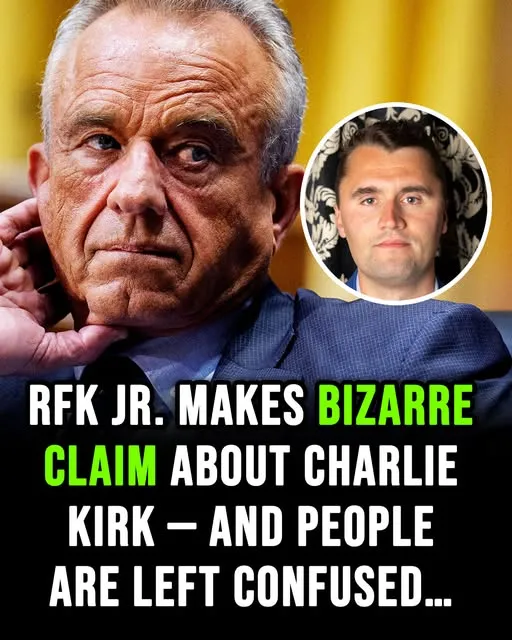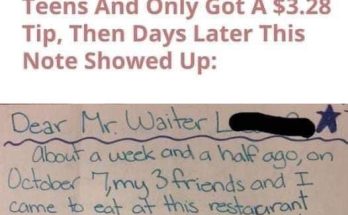It was a solemn Sunday at the Kennedy Center in Washington, D.C., where hundreds gathered to honor the memory of conservative commentator Charlie Kirk. The atmosphere was heavy with grief, reflection, and reverence. Family members, friends, and admirers of the late media figure came together to remember a man whose sudden and tragic passing has shaken communities across the nation.
One notable presence among the mourners was Robert F. Kennedy Jr., the Secretary of Health and Human Services. President Donald Trump did not attend, but Kennedy stood before the audience and offered words of tribute. His speech, however, quickly became the subject of national conversation—not because of what he said about Kirk’s legacy, but because of an unusual personal story that left many puzzled.
A Nation Stunned
Charlie Kirk’s death has been one of the most talked-about tragedies in recent months. The 30-year-old conservative media personality lost his life last Wednesday during a public appearance at Utah Valley College. The shocking event was followed by a tense 33-hour manhunt before the alleged suspect, 22-year-old Tyler Robinson, surrendered to authorities.
In the days that followed, vigils sprouted in cities across the United States. Supporters lit candles, shared memories, and prayed for Kirk’s family. His death struck a chord with many Americans who admired his outspokenness, his youthful energy, and his ability to connect with younger generations on political and cultural issues.
To honor his life, two major memorials were scheduled. The first was the gathering at the Kennedy Center, where Kennedy delivered his speech. The second, a larger service, is set to take place on September 21 at State Farm Stadium in Glendale, Arizona, where President Trump is expected to attend.
Kennedy’s Emotional Tribute — and a Strange Claim
When Robert F. Kennedy Jr. took the stage at the Kennedy Center, his words initially resonated with warmth and empathy. He spoke about his 17-year-old niece, preparing for her own journey into adulthood, and reflected on how Kirk had inspired millions of young Americans.
“There are millions and millions of kids around the country who he inspired,” Kennedy said. “They want to live the way Charlie Kirk lived. And that’s a great thing for our country.”
Up to that point, the tribute drew nods and quiet appreciation from the crowd. But then Kennedy shifted to a story that startled listeners and quickly spread across social media.
According to Kennedy, he first met Charlie Kirk in 2001.
“I met Charlie for the first time in July of 2001. I went on his podcast, and I think we approached each other with a lot of trepidation at that time, but by the end of the podcast, we were soulmates. We were spiritual brothers,” Kennedy said.
He continued by describing how their “friendship blossomed” in the years that followed.
A Timeline That Didn’t Add Up
The problem with Kennedy’s statement was quickly apparent to many. Charlie Kirk was born in October 1993, which would have made him just eight years old in 2001. Moreover, his podcast did not exist until nearly two decades later, in 2020.
Listeners were left scratching their heads. Some speculated that Kennedy had simply misspoken and meant 2021 rather than 2001. Others, however, seized on the odd detail as an example of what they saw as carelessness or exaggeration from a high-ranking public official.
Within hours, social media erupted with commentary.
“In 2001, Charlie Kirk was eight years old,” one user pointed out.
Another quipped: “RFK Jr., claiming he bonded with 8-year-old Charlie Kirk on a 2001 podcast that didn’t exist yet? That’s not a soulmate story—it’s a straight-up hallucination.”
The criticism grew louder as more commentators chimed in, calling the claim a clear error, and accusing Kennedy of bending the truth.
Supporters Say It Was Just a Slip of the Tongue
Not everyone was so quick to condemn. Some listeners defended Kennedy, pointing out that public speakers often make verbal mistakes, especially in emotional moments.
“He meant 2021. People make mistakes,” one supporter wrote online.
Another added: “This is just a misspeak. Likely meant 2021 (I’ve made the same slip before).”
To his defenders, the controversy was more about nitpicking than substance. They argued that the true purpose of Kennedy’s remarks was to pay tribute to Kirk’s impact and to comfort a grieving community, not to get bogged down in exact dates.
The Larger Picture: A Community in Mourning
While Kennedy’s remarks have stolen headlines, the focus for many remains on the deep loss felt by Kirk’s family, friends, and followers. The Kennedy Center service was marked by solemn music, heartfelt speeches, and the presence of political leaders who came together despite differences to honor a life cut short.
Charlie Kirk’s ability to inspire younger Americans was a recurring theme throughout the evening. Though divisive in his public persona, supporters described him as someone who energized debates, gave a voice to many who felt unheard, and left a lasting mark on the nation’s political landscape.
For older generations attending the service, the tragedy underscored how fleeting life can be and how suddenly it can change. Many spoke of the importance of cherishing family, investing in meaningful relationships, and living with purpose while there is still time.
What Comes Next
The story of Charlie Kirk’s passing is still unfolding. His funeral service on September 21 is expected to draw thousands of attendees and widespread media attention. President Donald Trump’s anticipated presence will further elevate the event’s visibility.
As for Kennedy’s unusual comment, time may soften its sting. Whether viewed as an unfortunate misstatement or a moment of confusion, it does not change the gravity of the loss at hand. The country has lost a prominent figure, and families across America have been reminded once again of life’s fragility.
A Moment to Reflect
For older Americans, moments like these serve as more than just headlines. They invite reflection on the unpredictability of life, the importance of speaking truthfully, and the role of legacy. Charlie Kirk, though young, left behind a platform and message that will continue to influence future generations.
Robert F. Kennedy Jr.’s words—controversial as they may have been—also remind us that grief can sometimes bring awkwardness, missteps, and even moments of confusion. But in the end, what matters most is the attempt to honor and remember, even when the words do not come out perfectly.
As the nation prepares for the funeral in Arizona, the hope among many is that the focus will shift back to the life lived rather than the slip of the tongue that followed.



